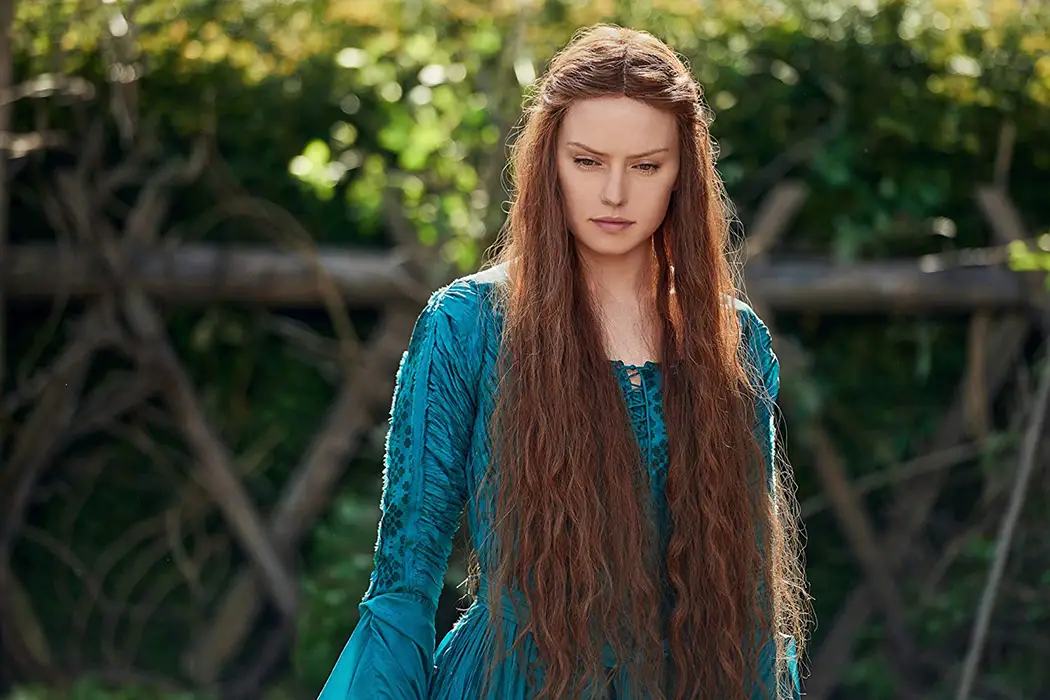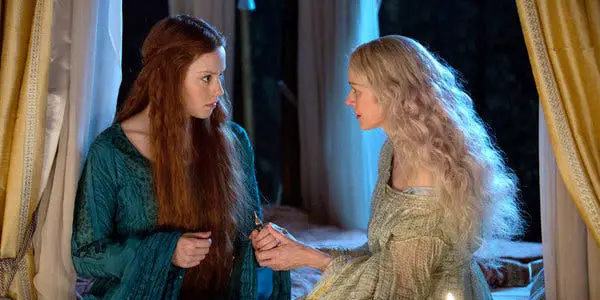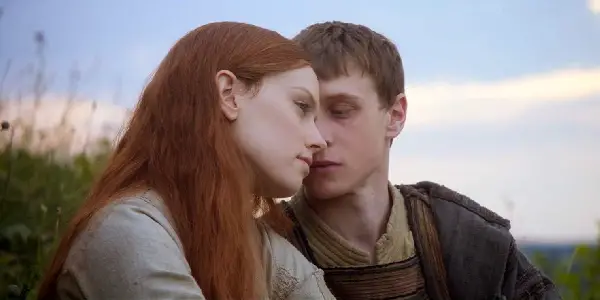OPHELIA: An Enticing Revisionist Film That Showcases Daisy Ridley’s Talents

David is a film aficionado from Colchester, Connecticut. He enjoys…
Though perhaps associated more directly with the Western, the subgenre of revisionist films can apply to multiple genres, in that they take a story, fictional or otherwise, and portray certain characters and people in a more favorable light. Often, it focuses on a class of people who have been stereotyped in film, such as Native Americans in Westerns.
In Ophelia, the focus is on the title character from Shakespeare‘s Hamlet. Told through her perspective, it gives a sympathetic and empowered view of the character that has more traditionally been seen in a tragic light. It’s not a masterful, game-changing alteration, yet it’s still a story worth telling.
Modern Shakespeare
Ophelia contains the same basic framework as the play. Ophelia (Daisy Ridley) is a rebellious young girl who is taken under wing by Queen Gertrude (Naomi Watts). Ophelia doesn’t get along much with Gertrude’s other ladies, finding herself less amused by traditional female interests, and often spends her time alone. Soon, Hamlet (George MacKay) returns from his studies and, after an unexpected run-in, immediately finds himself attracted to Ophelia. Though at first rebuffing his advances, the two fall in love, though their relationship is looked down upon by the higher lords, including the newly-crowned King Claudius (Clive Owen).

The story, as mentioned, follows along with the major plot points of the famous play, though there are additional characters that are added and certain events that are slightly altered. An example is the inclusion of an additional character named MeChild, also played by Naomi Watts, a mysterious woman who is an expert in the mystic arts. Her role within the scope of the story seems slight at first, though it eventually becomes more significant as the film progresses.
Much of Ophelia does come off as similarly slight, though, as the film somewhat awkwardly proceeds through the motions of Shakespeare’s play. Directed by Claire MacCarthy, and based on the young adult novel by Lisa Klein, the film thankfully benefits from a female perspective, yet it also is tied down by a need to connect all the dots of the original story. Those who are familiar with the major events of Hamlet may be amused to see how they come into focus here, yet there are only slight alterations at first, such that the film almost feels pointless, since it follows so closely along with the story we know so well.

The romance between Ophelia and Hamlet, for example, is about as storybook as you can imagine. It can basically be summed up as follows: boy meets girl, girl refuses boy, boy persists, they fall in love. For a movie attempting to insert a modern perspective into its story-line, it’s this half-baked love story that often holds it back the most. It doesn’t help much that the chemistry is lacking between Daisy Ridley‘s Ophelia and George MacKay‘s Hamlet.
Also notably coming up short is the supporting characters of Ophelia. With too much focus on the aformentioned romance between Hamlet and Ophelia, the film misses an opportunity to delve further into the inner conflictions of Naomi Watts’ Gertrude or the ruthless villainy of Clive Owen‘s Claudius. Tom Felton‘s Laertes or Dominic Mafham‘s Polonius are rarely seen, such that their eventual fates don’t have as much impact on the story. What we’re unfortunately left with, then, is a story that, while admirably told from Ophelia’s perspective, doesn’t feel as full due to the lack of development overall.
Picking Up Steam
Besides these shortcomings, though, Ophelia does eventually come together in its latter half, and it’s here where Daisy Ridley really gets the chance to shine. Known well to audiences as Rey from the new Star Wars trilogy, here Ridley shows why she deserves even more wide-ranging roles. After Ophelia’s somewhat forced romance with Hamlet hits a wall, she moves on to make tough decisions and eventually rises above the people around her, coming away from the film as the only character who seemingly has the correct virtues in focus. Where this film veers off from the original story is what allows it to stand on its own two feet, and much of that is due to Ridley‘s fierce performance.
Ophelia as a whole does manage to distinguish itself in its nuanced details as well, which become more prominent as the film progresses. The characters speak closer to modern-day English, and the performances, though occasionally over-the-top, are not nearly as theatrical as they would be on stage. The production and costume design are lavish, though also more toned-down as well, not becoming overly distracting to the story being told.

There are also some gorgeous shots and editing here, such as in the film’s closing moments, which juxtapose several of the characters’ fates alongside one another, fully bringing out the more powerful messages of Ophelia. Here, the film’s primary musical theme also achieves prominence, which sounds much like a classically influenced Pop song.
Within the theme, you can here these words repeating: “Doubt that the stars are fire. Doubt that the sun doth move. Doubt truth to be a liar. But never doubt I love.” It’s a clever tie-in with the original play, in which Hamlet uses these words in a letter to Ophelia. Using them here shows the complete diversion McCarthy‘s film has made from that story.
Conclusion: Ophelia
To conclude, Ophelia, though flawed, is nonetheless the type of revisionist story we need right now. Told from a female perspective, and benefiting from a seminal performance by Daisy Ridley, it rewrites history in a more favorable light. My hope is that this type of story will become more common as time goes on. After all, though Shakespeare has his place in history, it’s modern audiences who will benefit most if we cast his more neglected characters, such as Ophelia, in a more favorable light.
What are your thoughts on Ophelia? Are you a fan of revisionist films? Let us know in the comments below.
Ophelia was release to limited theaters and VOD on June 28, 2019.
Does content like this matter to you?
Become a Member and support film journalism. Unlock access to all of Film Inquiry`s great articles. Join a community of like-minded readers who are passionate about cinema - get access to our private members Network, give back to independent filmmakers, and more.
David is a film aficionado from Colchester, Connecticut. He enjoys writing, reading, analyzing, and of course, watching movies. His favorite genres are westerns, crime dramas, horror, and sci-fis. He also enjoys binge-watching TV shows on Netflix.













